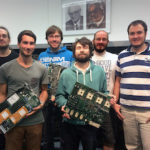Researchers from MIT and other institutions report that a “hash function” — a core database search operation — can be significantly accelerated through the use of machine learning. The hope is that the new technique could accelerate computational systems that scientists use to store and analyze DNA, amino acid sequences, or other biological information.
RSC Tornado Breaks Record with 1.41 Petaflops per Rack
Today Russia’s RSC Group announced that the company has achieved a record compute density of 1.41 Pflops per rack using direct liquid cooling and Intel Xeon Phi processors. “RSC supported the TUM student team from Munich with 8 nodes mobile cluster based on RSC Tornado direct liquid cooled architecture. This computing system provided stable operation of computing nodes in “hot water” mode at +63 °С cooling agent temperature at node inputs and had the following configuration: 72-cores Intel Xeon Phi 7290 processors, Intel S7200AP server boards, Intel SSD DC S3500 Series M.2 340 GB solid-state drives, switch and adapters based on Intel Omni-Path high-speed fabric, highly efficient Micron DDR4-2400 VLP 16-32 GB memory modules.”
GCS Supports Two German Teams for the SC16 Student Cluster Competition
Today the Gauss Centre for Supercomputing (GCS) in Germany announced it is co-sponsoring undergraduate students participating in the SC16 Student Cluster Competition (SCC). This year, GCS provides financial support for two German teams which were accepted for the multi-disciplinary HPC challenge integrated within the Supercomputing Conference 2016 (SC16) in Salt Lake City (Utah, USA): team […]






